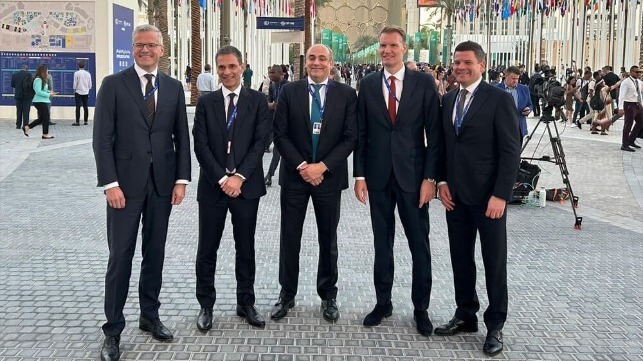Capuava oil refinery owned by Petrobras sits in Maui, on the outskirts of Sao Paulo, Brazil, Monday, Nov. 6, 2023. (AP Photo/Andre Penner, File)
COP28 President Sultan al-Jaber speaks during a session at the COP28 U.N. Climate Summit, Saturday, Dec. 2, 2023, in Dubai, United Arab Emirates. (AP Photo/Kamran Jebreili)
BY JON GAMBRELL, PETER PRENGAMAN AND SETH BORENSTEIN
December 2, 2023Share
DUBAI, United Arab Emirates (AP) — Fifty oil companies representing nearly half of global production have pledged to reach near-zero methane emissions and end routine flaring in their operations by 2030, the president of this year’s United Nations climate talks said Saturday, a move that environmental groups called a “smokescreen.”
Methane emissions are a significant contributor to global warming, so sharply reducing them could help slow temperature rise. If the companies carry out their pledges, it could trim one-tenth of a degree Celsius (0.18 degrees Fahrenheit) from future warming, a prominent climate scientist calculated and told The Associated Press. That is about how much the Earth is currently warming every five years.
The announcement by Sultan al-Jaber, president of the climate summit known as COP28 and head of the Abu Dhabi National Oil Co., comes as he and others have insisted his background would allow him to bring oil companies to the negotiating table. Al-Jaber has maintained that having the industry’s buy-in is crucial to drastically slashing the world’s greenhouse emissions by nearly half in seven years to limit global warming to 1.5 degrees Celsius (2.7 degrees Fahrenheit) compared with pre-industrial times.
Signing on to the pledge were major national oil companies such as Saudi Aramco, Brazil’s Petrobras and Sonangol, from Angola, and multi-nationals like Shell, TotalEnergies and BP.
“The world does not work without energy,” said al-Jaber, speaking in a session on the oil industry. “Yet the world will break down if we do not fix energies we use today, mitigate their emissions at a gigaton scale, and rapidly transition to zero carbon alternatives.”
As if anticipating critiques, al-Jaber added: “Is it enough? Hear me out, please. No, it’s not enough. I say with full passion and conviction, I know that much more can be done.”
For months leading up to COP28, there was speculation of action on methane. Not only do methane leaks, along with flaring, which is burning of excess methane, and venting of the gas, all contribute to climate change, but these problems can largely be solved with current technologies and changes to operations. Indeed, oil and gas companies could have taken such measures years ago but largely have not, instead focusing more on expanding production than focusing on the byproduct of it.
In that way, the methane deal represented a potentially significant contribution to combatting climate change that also largely maintained the status quo for the oil and gas industry. Many environmental groups were quick to criticize it.
The pledge is a “smokescreen to hide the reality that we need to phase out oil, gas and coal,” said a letter signed by more than 300 civil society groups.
Jean Su, energy justice director at the Center for Biological Diversity, said “the commitments to cut methane are significant, but they address the symptom, not the source.”
But Environmental Defense Fund President Fred Krupp said Saturday’s deal “could be the single most impactful day of announcements from any COP in my 30 years at the Environmental Defense Fund.”
Methane has caused about half of the world’s warming since pre-industrial times, al-Jaber said, promoting the deal as significant. However, methane escaping from oil and gas drilling is only about 23% of the world’s methane emissions, with agriculture and waste being bigger culprits, said Climate Analytics CEO Bill Hare, the climate scientist who calculated the proposal would trim a tenth of a degree from future warming.
“It would be a significant, but not a fundamental contribution” to making sure average temperatures don’t rise beyond 1.5 degrees, Hare said. To keep within that limit, the world needs to cut carbon dioxide about 40% and methane by about 60% by 2030, he said.
Methane can be released at several points along the operation of an oil and gas company, from fracking to when natural gas is produced, transported or stored. Over a shorter period, it’s 86 times more powerful than carbon dioxide. However, methane stays in the air only a couple decades — unlike thousands of years for carbon dioxide — so reducing methane faster is “low-hanging fruit” because it’s easier and changes future warming more, al-Jaber said.
Marcelo Mena, CEO of Global Methane Hub, an alliance of philanthropies and organizations focused on reducing methane emissions, said that having near-zero methane emission commitments should not be seen as delaying a phase out of fossil fuels, as some environmental groups claimed.
“We wouldn’t let oil companies leak into the ocean until phase out, so why would we let them leak out methane to super charge climate change?” said Mena, a former environment minister in Chile.
Still, Mena said that self-reporting didn’t go far enough to push oil and gas companies to make changes. Instead, he said putting a price on pollution, or companies finding themselves shut out of markets that require high standards with leaks, would force change.
Stricter regulations are beginning to take hold. On Saturday, the U.S. Environmental Protection Agency issued a final rule aimed at reducing methane emissions and other harmful air pollutants generated by the oil and gas industry. It targets emissions from existing oil and gas wells nationwide. Previous EPA regulations only focused on new wells. It also regulates smaller wells that will be required to find and plug methane leaks.
The United States will now have “the strongest methane regulations in the world,” White House climate adviser John Podesta told the AP.
Earlier this year, European Union negotiators reached a deal to reduce methane emissions from the energy industry across the 27-member bloc. The agreement bans routine venting and flaring, and mandates strict reporting. By 2027, it will expand those norms to oil and gas exporters outside the bloc.
Saturday’s announcement did not address the oil and natural gas being burned off by the end users, so-called Scope 3 emissions, which can be motorists in their cars or plants powering cities. In his speech, al-Jaber said oil and gas companies needed to do more to research solutions to Scope 3 emissions.
The Oil and Gas Decarbonization Charter is backed by both the United Arab Emirates and neighboring Saudi Arabia, two OPEC heavyweights. Saudi Arabia’s vast oil resources, located close to the surface of its desert expanse, makes it one of the world’s least expensive places to produce crude. Both Abu Dhabi’s ADNOC and Aramco, the world’s third-most-valuable company, have signed onto the pledge.
Separately, organizers said more than 100 countries have signed onto a pledge to triple the world’s installed renewable energy capacity by 2030, something pledged in September by leaders of the so-called Group of 20. Their countries emit 80% of all planet-warming gases.
____
Associated Press climate and environmental coverage receives support from several private foundations. See more about AP’s climate initiative here. The AP is solely responsible for all content.

JON GAMBRELL
Gambrell is the news director for the Gulf and Iran for The Associated Press. He has reported from each of the Gulf Cooperation Council countries, Iran and other locations across the world since joining the AP in 2006.

PETER PRENGAMAN
Prengaman leads AP’s global climate and environment team. He is based in New York.
SETH BORENSTEIN
Seth is a science writer, covering climate & other topics.
Dubai (AFP) – Fifty oil and gas companies representing 40 percent of global production pledged to decarbonise their operations by 2050 at the UN's COP28 climate talks in Dubai on Saturday.
Issued on: 02/12/2023

Saudi giant Aramco and ADNOC of the United Arab Emirates were among 29 national companies to sign a non-binding agreement that also envisaged zero methane emissions and eliminating routine flaring this decade.
Aramco, the world's biggest oil company, and ADNOC, whose CEO Sultan Al Jaber is president of CO28, had already announced similar CO2-reduction targets -- which do not include emissions when their fuels are used by customers.
"Whilst many national oil companies have adopted net-zero 2050 targets for the first time, I know that they and others, can and need to do more," Jaber said.
Unlike the Western oil majors, which are intensely scrutinised by the public, few large national oil companies had announced such targets.
PetroChina and Brazil's Petrobras also signed up to the new accord, named the Oil and Gas Decarbonization Charter.
The National Oil Company of Libya, Malaysia's Petronas and Sonangol of Angola were also among the signatories, along with France's TotalEnergies, US firm ExxonMobil, and Britain's BP and Shell.
The charter is part of a set of initiatives designed to accelerate the decarbonisation of the global energy industry, prepared in the year leading up to COP28.
They are voluntary commitments unlike the decisions of COP28, which are taken by consensus between nearly 200 countries under the aegis of the United Nations.
Melanie Robinson, of the World Resources Institute, a non-profit research body, said the agreement showed that non-binding pledges from the industry were not sufficient to address climate change.
"This charter is proof that voluntary commitments from the oil and gas industry will never foster the level of ambition necessary to tackle the climate crisis," she said.
"We can't meet our climate goals unless governments set policies that rapidly and equitably transition our economy away from fossil fuels."
© 2023 AFP
Five CEOs Call for Regulatory Partnership and End to Fossil Fuel Ships

The CEOs of five of the world’s largest shipping companies took the unusual step of joining together to outline a shared vision to accelerate the decarbonization of the global maritime industry. Timed to the conclusion of the UN’s COP 28 conference in Dubai, the executives of CMA CGM, Maersk, MSC, Hapag, and Wallenius Wilhelmsen called for cooperation including an alliance with the International Maritime Organization and the definitive regulatory measures needed to create the investment conditions critical to accelerating the industry’s green transition.
As four of the largest container shipping companies, along with the leader in vehicle logistics, each of the companies highlights that they have taken steps to drive the transition. They are investing in efforts within their fleets and reiterating their belief that the importance of shipping achieving the IMO’s greenhouse gas targets is very clear.
“A crucial next step is to introduce regulatory conditions which ensure that we create the most greenhouse gas emission reductions per invested dollar,” said Vincent Clerc, CEO of A.P. Moller – Maersk. “The momentum for green fuel is building and we are pleased to see strong partnerships across the industry as we continue our joint efforts of making decarbonization in shipping successful.”
As frontrunners, the CEOs are convinced that even closer collaboration with IMO regulators will produce the effective and concrete policy measures needed to underpin the investment within maritime shipping and its ancillary industries that will enable decarbonization to occur at the pace required. Their joint declaration calls for the establishment of regulatory cornerstones to ensure the next steps for the industry and support the transition.
Soren Toft, Chief Executive Officer of MSC Mediterranean Shipping highlights the belief that the shipping industry is at the forefront of technological innovation when it comes to decarbonization. He added, “The support of governments across the world will be an essential element to reach our common goal.”
The headline grabber from the executives is a call to set an end date for the new building of fossil fuel-only vessels and a clear GHG Intensity Standard timeline to inspire investment confidence for new construction and the required fuel infrastructure. They however are also calling for vessel pooling in regulatory compliance so that the performance of a group of vessels could count instead of only individual new builds.
“We believe that a regulatory framework and clear targets are crucial to accelerating the introduction of alternative fuels and reducing our carbon footprint,” said Rolf Habben Jansen, CEO of Hapag Lloyd.
Asserting that regulation can play a key role in mitigating the cost of the green transition, the CEOs are also endorsing a global maritime GHG pricing mechanism with “predictable pricing,” which they said could be used to build incentives for energy efficiency. To reduce the price gap between fossil fuel and sustainable marine fuels they are also calling for a pricing mechanism to level the field. They called for distributing the premium for green fuels across all the fossil fuels and suggested the “green balance fee” should go to an RD&D fund and investments in developing countries.
Rodolphe Saade, Chairman and CEO of CMA CGM Group agreed that the program sets ambitious milestones saying that the industry should reach the upper targets of the IMO trajectory. Speaking for the coalition he also called for others to follow them and join in the efforts to accelerate decarbonization.
Dubai (AFP) – They call the giant climate business expo running outside the COP28 United Nations talks in Dubai the "green zone".
Issued on: 02/12/2023 -

ADVERTISING
With the enormous former Expo 2020 site given over to green -- and not so green -- companies to trumpet their climate credentials, the private sector has never been embraced so warmly at a climate summit as it has been in the oil-rich city state.
An astonishing 400,000 visitors have registered for day passes to the futuristic jamboree, with stands touting the latest carbon capture tech to a vegetable garden trying to hold up under the desert heat.
And that is not counting the 80,000 people accredited to the talks themselves.
Corporate pledges have been coming thick and fast, with Dubai-based Emirate Airlines -- which has its own pavilion -- heralding its first flight with "100 percent sustainable aviation fuel" and BNP Paribas bank saying they were phasing out financing projects related to extracting coking coal.
Others have been more hazy. The public relations teams of big companies feel they have to "come up with something during COP", sustainable finance expert Laurent Lascols told AFP. But most of the time they recycle "something they already have on the go".
But Sanda Ojiambo, assistant secretary-general of UN Global Compact, which tries to spur corporations towards sustainable development, praised the "very active and dynamic business movement that happens at COP.

"As long as it's credible and tangible and transparent, I think it really continues to demonstrate forward-looking discussion," she added.
But only 18 percent of big firms worldwide are cutting emissions "fast enough to reach net zero by 2050", according to a report last month by consultants Accenture.
Another by the Boston Consulting Group found that just 14 percent had reduced their carbon emissions in line with their own ambitions in the past five years -- and only one in 10 measured them precisely.
While COP28's Emirati president Sultan Al Jaber could not be more business friendly, experts say lingering suspicions of conflicts of interest -- Jaber is also CEO of the UAE's national oil and gas company -- put corporations in a complicated position.
Big business commitments
It is not as easy to make big announcements in Dubai "where you might be in the firing line" compared with the COP26 in Glasgow, said Lascols, because the UK was "more a model pupil in terms of energy transition".

"We did ask ourselves the question" whether we should go to Dubai, admitted the representative of a large French group, before deciding to press ahead "because it is important to take every chance to help move the lines". Other companies questioned by AFP took a similar stance.
But corporations are also at COP28 to influence as well as sell, with a huge number of lobbyists present.
And not all of them are trying to help wriggle out of responsibility for the climate.
More than 200 major corporations including the likes of Ikea, Coca-Cola, Sony, DHL, Heineken and Nestle have recently called on national leaders to set a timeline for phasing out unabated fossil fuels –- without the use of controversial carbon capture and storage technologies.
Many of them are also urging their energy suppliers to do the same and decarbonise their businesses.
Maria Mendiluce, head of We Mean Business, which coordinated the appeal, said we need to back companies trying to do the right thing. "We tend to focus on criticising those who are doing something... (but) we need to highlight those that are not doing anything."
No comments:
Post a Comment